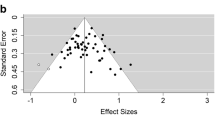Abstract
This squib continues the ongoing conversation about the direction and future of CSCL, initiated by Wise and Schwarz (International Journal of Computer-Supported Collaborative Learning, 12, 423–467, 2017) and the ijCSCL editors. It argues that CSCL should take an emancipatory perspective to learners’ agency and its technological substratum. The implication is that learners should be empowered to select, change, inter-operate and/or adapt not only the software applications they use, but more generally, the support they obtain from these technologies. This raises many exciting questions and challenges for CSCL in terms of educational, social, design and technical considerations.
Similar content being viewed by others
Explore related subjects
Discover the latest articles and news from researchers in related subjects, suggested using machine learning.References
Betbeder, M.-L., & Tchounikine, P. (2003). Symba: A framework to support collective activities in an educational context. In International Conference on Computers in Education (ICCE 2003), Hong-Kong (China) (pp. 188–196).
Dillenbourg, P. (2013). Design for classroom orchestration. Computers & Education, 69, 485–492.
Dillenbourg, P., & Hong, F. (2008). The mechanics of CSCL macro scripts. International Journal of Computer-Supported Collaborative Learning, 3(1), 5–23.
Dillenbourg, P., & Tchounikine, P. (2007). Flexibility in macro-scripts for CSCL. Journal of Computer Assisted Learning, 23(1), 1–13.
Fischer, F., Kollar, I., Mandl, H., & Haake, J. M. (2007). Scripting computer-supported collaborative learning: Cognitive, computational and educational perspectives (Vol. 6). Springer Science & Business Media.
Jermann, P., Soller, A., & Muehlenbrock, M. (2001). From mirroring to guiding: A review of the state of art technology for supporting collaborative learning. In European Conference on Computer-Supported Collaborative Learning EuroCSCL-2001 (pp. 324–331).
Ludvigsen, S., Cress, U., Law, N., et al. (2017). Future direction for the CSCL field: Methodologies and eight controversies. International Journal of Computer-Supported Collaborative Learning, 12(4), 337–341.
Magnisalis, I., Demetriadis, S., & Karakostas, A. (2011). Adaptive and intelligent systems for collaborative learning support: A review of the field. IEEE Transactions on Learning Technologies, 4(1), 5–20.
Moguel, P., Tchounikine, P., & Tricot, A. (2011). Interfaces leading groups of learners to make their shared problem-solving organization explicit. IEEE Transactions on Learning Technologies, 5(3), 199–212.
Mørch, A. I. (1997). Three levels of end-user tailoring: Customization, integration, and extension. In M. Kyng & L. Mathiassen (Eds.), Computers and design in context (pp. 51–76). Cambridge: MIT Press.
Näykki, P., Isohätälä, J., Järvelä, S., et al. (2017). Facilitating socio-cognitive and socio-emotional monitoring in collaborative learning with a regulation macro script – an exploratory study. International Journal of Computer-Supported Collaborative Learning, 12(3), 251–279.
Prieto, L. P., Asensio-Perez, J. I., Munoz-Cristóbal, J. A., Dimitriadis, Y. A., Jorrín-Abellán, I. M., & Gomez-Sanchez, E. (2013). Enabling teachers to deploy CSCL designs across distributed learning environments. IEEE Transactions on Learning Technologies, 6(4), 324–336.
Rummel, N. (2018). One framework to rule them all? Carrying forward the conversation started by wise and Schwarz. International Journal of Computer-Supported Collaborative Learning, 13(1), 123–129.
Rummel, N., Walker, E., & Aleven, V. (2016). Different futures of adaptive collaborative learning support. International Journal of Artificial Intelligence in Education, 26(2), 784–795.
Soller, A., Martínez, A., Jermann, P., & Muehlenbrock, M. (2005). From mirroring to guiding: A review of state of the art technology for supporting collaborative learning. International Journal of Artificial Intelligence in Education, 15(4), 261–290.
Stahl, G. (2016). The group as paradigmatic unit of analysis: The contested relationship of CSCL to the learning sciences. In M. A. Evans, M. J. Packer, & R. K. Sawyer (Eds.), Reflections on the learning sciences (ch. 5). New York: Cambridge University Press.
Stahl, G., Koschmann, T., & Suthers, D. (2006). Computer-supported collaborative learning: An historical perspective. In R. K. Sawyer (Ed.), Cambridge handbook of the learning sciences (pp. 409–426). Cambridge: Cambridge University Press.
Tchounikine, P. (2008). Operationalizing macro-scripts in CSCL technological settings. International Journal of Computer-Supported Collaborative Learning, Springer, 3(2), 193–133.
Tchounikine, P. (2011). Computer science and educational software design – A resource for multidisciplinary work in technology enhanced learning. Springer. https://doi.org/10.1007/978-3-642-20003-8_6.
Tchounikine, P. (2013). Clarifying design for orchestration: Orchestration and orchestrable technology, scripting and conducting. Computers & Education, 69, 500–503.
Tchounikine, P. (2016). Contribution to a theory of CSCL scripts: Taking into account the appropriation of scripts by learners. International Journal of Computer-Supported Collaborative Learning, 11(3), 349–369.
Tchounikine, P. (2017). Designing for appropriation: A theoretical account. Human–Computer Interaction, 32(4), 155–195.
Tchounikine, P. (2019). Framing design for appropriation with zones of proximal evolution: Email for PIM. International Journal of Human-Computer Studies, 123, 18–28.
Tchounikine, P., Rummel, N., & McLaren, B. M. (2010). Computer supported collaborative learning and intelligent tutoring systems. In R. Nkambou, J. Bourdeau, & R. Mizoguchi (Eds.), Advances in intelligent tutoring systems. Studies in computational intelligence (Vol. 308). Berlin, Heidelberg: Springer.
Wang, X., Kollar, I., & Stegmann, K. (2017). Adaptable scripting to foster regulation processes and skills in computer-supported collaborative learning. International Journal of Computer-Supported Collaborative Learning, 12(2), 153–172.
Wecker, C., Stegmann, K., Bernstein, F., Huber, M. J., Kalus, G., Rathmeyer, S., Kollar, I., & Fischer, F. (2010). S-COL: A Copernican turn for the development of flexibly reusable collaboration scripts. International Journal of Computer-Supported Collaborative Learning, 5(3), 321–343.
Weinberger, A., Stegmann, K., & Fischer, F. (2010). Learning to argue online: Scripted groups surpass individuals (unscripted groups do not). Computers in Human Behavior, 26(4), 506–515.
Wild, F., Kalz, M. & Palmér, M. (2008). Mash-Up Personal Learning Environments. Proceedings of 1st Workshop MUPPLE’08, Maastricht, The Netherlands, September 17, 2008, CEUR Workshop Proceedings, ISSN 1613-0073, online CEUR-WS.org/Vol-388/.
Wise, A., & Schwarz, B. (2017). Visions of CSCL: Eight provocations for the future of the field. International Journal of Computer-Supported Collaborative Learning, 12, 423–467.
Wright, E. O. (2010). Envisioning real utopias. London: Verso.
Author information
Authors and Affiliations
Corresponding author
Additional information
Publisher’s note
Springer Nature remains neutral with regard to jurisdictional claims in published maps and institutional affiliations.
Rights and permissions
About this article
Cite this article
Tchounikine, P. Learners’ agency and CSCL technologies: towards an emancipatory perspective. Intern. J. Comput.-Support. Collab. Learn 14, 237–250 (2019). https://doi.org/10.1007/s11412-019-09302-5
Received:
Accepted:
Published:
Issue Date:
DOI: https://doi.org/10.1007/s11412-019-09302-5




